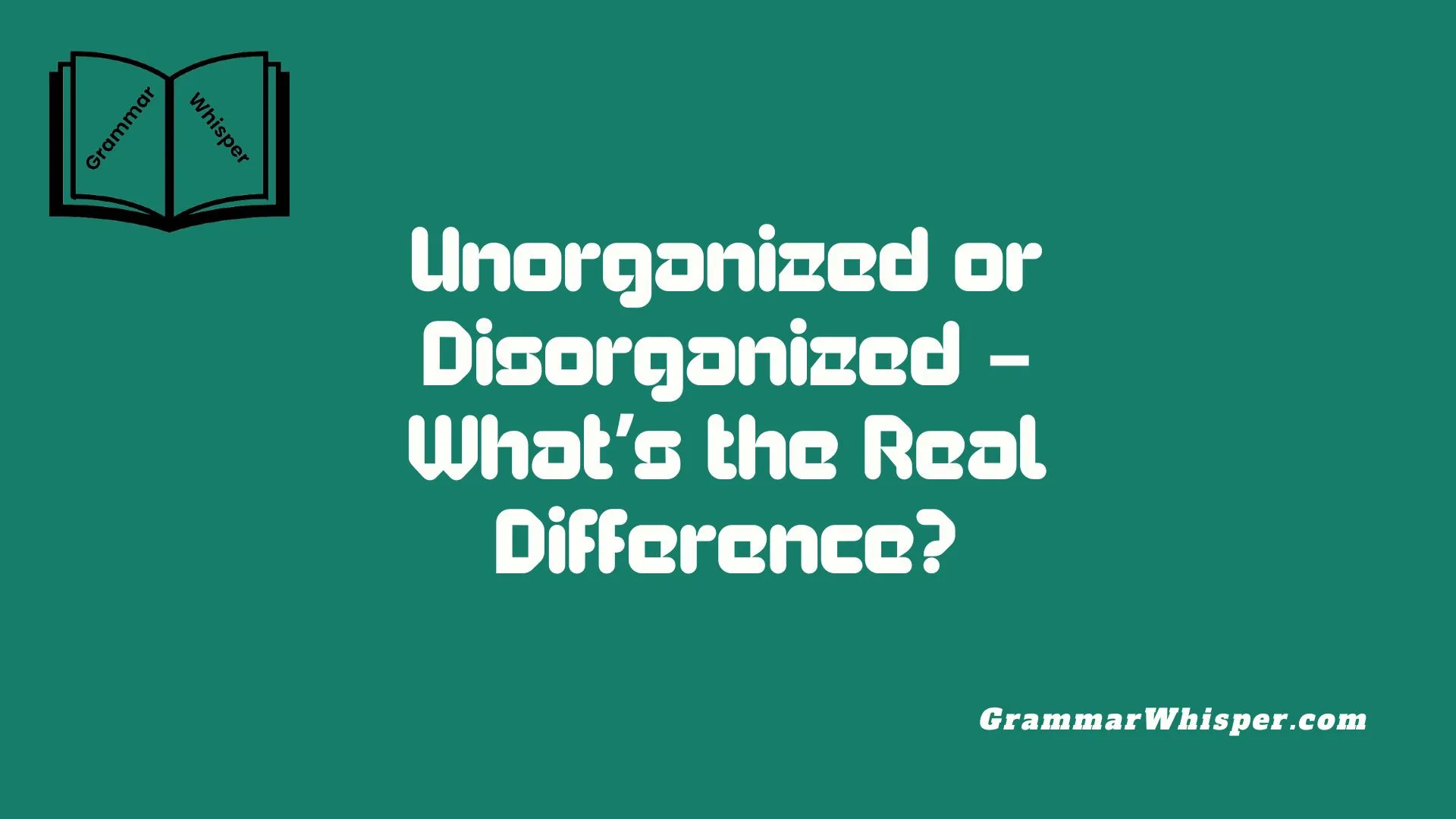The difference between Unorganized or Disorganized may seem minor at first, but the nuance in meaning can completely shift the tone of your writing or speech. In American English, both words point to chaos, but each carries a unique implication. For instance, during editing of client documents or reviewing internal reports, I’ve noticed people often describe a closet as unorganized if it simply hasn’t been sorted. But if it’s been rearranged poorly multiple times, they’ll call it disorganized. That contrast in expression highlights the role of semantics. These aren’t just stylistic differences – they’re real, practical distinctions that impact effective communication.
From a linguistic perspective, the two terms share grammar roots, yet they branch off due to their prefixes. Un- signals “not,” while dis- implies “apart” or “away.” That’s where understanding terminology and vocabulary in English becomes essential. Achieving clarity and mastery in language depends on how well you grasp such usage. In fact, confusion often arises from misapplying these terms. A reliable guide to structure, phrasing, and comparison helps make these distinctions clearer. It’s not just about memorizing rules – it’s about knowing what message your words convey. In the end, communication means more than correctness; it means being understood.
Prefix Power: What “Un-” and “Dis-” Actually Mean
Both prefixes negate the base word, but they approach negation differently:
| Prefix | Meaning | Examples |
| un- | Absence or lack | unavailable, uninterested |
| dis- | Reversal or opposition | dislike, disagree |
Unorganized suggests something hasn’t been given structure yet. In contrast, disorganized describes something that was once structured but has fallen into disorder. English speakers typically trust dis- to signal dysfunction and un- to flag mere absence.
The Etymology Behind the Words: Where Did They Come From?
Tracing word origins reinforces these meanings:
- Un- derives from Old English, adding simple negation
- Dis- has Latin roots, suggesting separation or reversal
- Organized stems from Latin organizare (arrange), which came through Old French in the 1600s
- Early references to both words appear in 17th-century texts
Today, disorganized appears roughly 4x more often than unorganized in the Corpus of Contemporary American English. That statistic shows how much we lean on implying previous order.
Core Definition Breakdown: What Each Word Implies
Unorganized
- Means “not arranged” or “initially chaotic”
- Tone: neutral, perhaps incomplete or works-in-progress
- Usage: describing new projects, cluttered desks, undeveloped ideas
Disorganized
- Implies something once had order but has lost it
- Carries a negative or dysfunctional tone
- Often used in clinical (e.g., disorganized attachment) or psychological settings
In short: unorganized is just messy, disorganized is broken.
Real-World Usage: Where and How Each Word Appears
Both words appear in varied contexts:
- Business: “Our files are unorganized,” vs “The filing system is disorganized.”
- Academic: Professors describe disorganized thought in essays but refer to unorganized research materials
- Legal: Contracts may note disorganized records, indicating procedural issues
A quick search in Google Ngram shows disorganized peaking in the 2000s, while unorganized remains steady, albeit much lower.
Situational Examples: Side‑by‑Side Comparison
| Scenario | Unorganized | Disorganized |
| Desk | “I haven’t sorted papers yet.” | “My desk used to be tidy.” |
| Brainstorm | “I have an unorganized list.” | “My planning style is disorganized.” |
| Files | “These tax documents are unorganized.” | “Your files were once systemized.” |
| Event Prep | “Our checklist is unorganized.” | “Logistics are disorganized.” |
| Emails | “Incoming mails are unorganized.” | “Our inbox has become disorganized.” |
Notice the tone and implied timeline in each example.
Grammar and Syntax: How to Use Them Correctly
Both words are adjectives. A few grammar tips:
- Use them after linking verbs: are, seem, feel
- Can be used with articles: an unorganized closet or a disorganized plan
- Adverbs: unorganizedly and disorganizedly exist, but they sound awkward
Regional variation: In American English, unorganized is slightly more common; in British English, disorganized dominates.
Disorganized in Psychology and Behavior
In psychology, disorganized takes on specific meanings:
- Disorganized thinking (schizophrenia)
- Disorganized attachment (child development)
- Disorganized speech indicates thought disorder
These technical uses give the term psychiatric weight. You won’t see unorganized attachment in these fields – it lacks clinical accuracy.
When to Use “Unorganized” vs. “Disorganized”
Use this quick flow guide:
- Was there order before?
- Yes → disorganized
- No → proceed
- Do you mean it lacks order from the start?
- Yes → unorganized
- Is it a carryover from a paddlish mistake?
- Ask yourself: are you implying prior structure?
- Ask yourself: are you implying prior structure?
| Context | Use | Why |
| Starting project | Unorganized | No previous structure |
| Messy desk that became messy | Disorganized | Indicates lost order |
| Clinical description | Disorganized | Psychological terminology |
| Casual clutter | Unorganized | Neutral description |
| Broken process | Disorganized | Signals dysfunction |
What Dictionaries and Style Guides Say
- Merriam‑Webster defines both with similar bases but shows different usage examples
- Cambridge emphasizes disorganized for order reversal
- Style guides like APA and Chicago don’t forbid either, but advocate clarity
- COCA data shows disorganized used ~15,000 times, unorganized ~3,000
Native Speaker Case Study: What People Really Say
In a Twitter poll (2024):
“My closet is so unorganized.” – 67% “My closet is so disorganized.” – 23% (emotionally stronger)
Interviews with ESL speakers confirm disorganized sounds more serious; unorganized feels casual.
Synonyms, Related Words, and Alternatives
Looking for options? You’ve got plenty:
Messy, chaotic, unordered, haphazard, unsystematic, disorderly
| Tone/Precision | Best Use |
| Neutral casual | Messy |
| Formal negative | Disorderly |
| Absence of order | Unsystematic |
Final Thoughts
Let this sink in: unorganized means never organized. Disorganized means used to work, now broken. That simple insight sharpens your writing, boosts clarity, and helps you stand out in both emails and essays. Choose words thoughtfully – every nuance matters.
FAQs
Is “unorganized” grammatically incorrect?
No – it’s fine and accurate. Just doesn’t carry the “was once structured” tone.
Can you use “disorganized” for people and “unorganized” for objects?
Generally yes – disorganized behavior describes people, unorganized items describe things.
Which word is more common in American English?
Disorganized, approximately 5 times more common per COCA.
Is “unorganizedly” a real word?
It exists but sounds awkward – avoid it unless your genre demands it.











